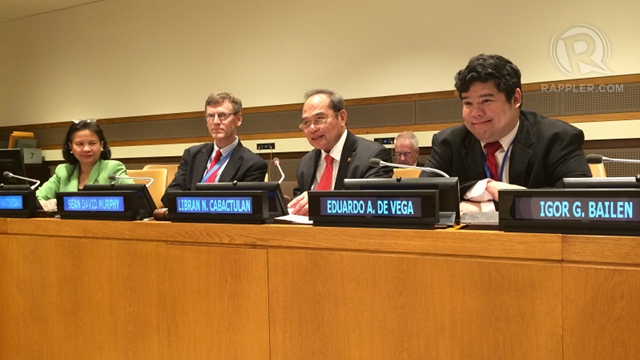SUMMARY
This is AI generated summarization, which may have errors. For context, always refer to the full article.
UNITED NATIONS – “Can international law be a law when it can be ignored or broken by states without any consequence?”
Philippine Ambassador to the United Nations Libran Cabactulan raised this question as he hosted a discussion at the UN on a topic closely related to the Philippines’ historic arbitration case against China on the South China Sea.
The lecture focused on how to get states to comply with international judicial and arbitral decisions, a key issue in the Philippine case that Beijing has rejected. The case is based on the 1982 UN Convention on the Law of the Sea (UNCLOS), which does not provide for any enforcement mechanism even if Manila gets a positive ruling.
International law scholar Sean D. Murphy of the George Washington University Law School said that in general, there is a “high level of compliance” with different types of judicial and arbitral decisions. Chinese diplomats also attended his lecture held at the UN Headquarters here in New York on Wednesday, October 29.
While Murphy did not talk about the Philippine-China case in particular, he said that states that are parties to agreements such as UNCLOS know that they are bound by the processes under these deals. China and the Philippines are both parties to UNCLOS, which includes a compulsory dispute settlement mechanism.
“The state does have to opt into the dispute settlement process at the beginning. They’re not sort of surprised by the fact that dispute settlement process has been created. I think that initial decision to join has a conditioning effect such that when you lose a case, there has already been some decision-making at some level that you might lose and you might have to comply with an adverse judgment,” Murphy said.
For land or sea disputes, Murphy said that countries will benefit from abiding by arbitral decisions.
“You may have a claim much more than what the tribunal is giving you but what the tribunal is giving you is certainty as to where the boundary is, and that has a lot of benefits, particularly if you want to explore natural resources or to sort out your relationship with another country,” the professor said.
Murphy is a former legal adviser to the US State Department, and represented countries in international courts and tribunals including Ethiopia, Kosovo, Macedonia, Suriname, and the United States.
The Philippines filed an arbitration case against China over a maritime dispute on the South China Sea. Manila calls the parts it claims the West Philippine Sea. (READ: What’s at stake in our case against China)
In a pleading it filed in March, the Philippines asked The Hague-based Permanent Court of Arbitration to declare Beijing’s so-called nine-dashed line claim “unlawful” and in violation of UNCLOS. China has until December 15 to respond but insists it will not participate in the arbitration, and questions the court’s jurisdiction.
China argues that the Philippines’ claim falls within the optional exceptions to dispute settlement it made when it ratified UNCLOS. Beijing invoked exceptions like maritime boundary delimitation.
China insists it has “indisputable sovereignty” over the South China Sea, parts of which Vietnam, Malaysia, Brunei and Taiwan are also claiming. A crucial shipping lane, the sea is believed to hold vast reserves of oil and gas.
‘Humanized world, not laws of jungle’
The UN discussion was the latest effort of the Philippines to raise public awareness and to seek global support for its arbitration case. China has been doing its own media blitz, recently inviting Filipino journalists to trips to explain its position.
In his opening remarks, the Philippine envoy to the UN hailed the importance of international law as a “cornerstone” for the peaceful settlement of disputes. He reiterated an argument the Philippines often makes: that international law is the “great equalizer” for small countries in disputes with superpowers.
Cabactulan made an obvious reference to China’s historical claim to the sea.
“The [rule of law] regime is controlled by I would say the humanized and modern world, not by laws of the jungle, of histories gone past. It’s a networked and globalized world …. Let it not be said that in the future, it will still be might that is the ruler rather than right be the order of the day,” the ambassador said.
Still, enforcement remains a big question in the Philippine case. Some analysts say that a possible ruling in Manila’s favor will still be a “moral victory” even if it cannot be enforced.
Professor Murphy said a negative side to the enforcement issue is that courts might soften their judgment to be more acceptable to the party they will rule against. He said it is possible that tribunals are aware that a decision in a particular case will result to non-compliance.
“For example, if an international court finds that a state has violated international law, it might then in thinking about what is the right reparation, say the reparation here should just be satisfaction. ‘We found that you engaged in wrongful behavior. We’re slapping you in the wrist.’ That’s not really asking you to do anything,” he said.
‘Absence puts court in awkward position’
Foreign delegates who attended the discussion asked Murphy whether or not the refusal of a country to join arbitration will affect the case. This is another issue relevant to the Philippine-China case as Beijing repeatedly refuses to take part.
Murphy echoed the Philippines’ position and the statements of other legal scholars that China’s absence will not undermine arbitration.
“Courts and tribunals do not regard [non-participation] as resulting in a default. Courts and tribunals view themselves as required to assess the merits as presented to them. They assess the claims and arguments as best as they can. ‘Do we have jurisdiction? What should be the outcome of the merits?’ And they reach a decision,” he said.
The professor said though that non-participation presents problems for courts and tribunals.
“They’re put in a very awkward position where they have to try to figure out what the right answer is. It’s unfortunate but for the system to work, you still have to let them issue a final, binding judgment. Because if all it took is not showing up for there to be no ability for the tribunal to issue a judgment, the whole system will fall apart.” – Rappler.com
Rappler multimedia reporter Ayee Macaraig is a 2014 fellow of the Dag Hammarskjöld Fund for Journalists. She is in New York to cover the UN General Assembly, foreign policy, diplomacy, and world events.
Add a comment
How does this make you feel?

![[Two Pronged] My friend has an abusive partner. What can I do?](https://www.rappler.com/tachyon/2024/04/limits-of-friendships-april-16-2024.jpg?resize=257%2C257&crop=414px%2C0px%2C1080px%2C1080px)
![[Two Pronged] Am I bi-curious? A lesbian? How do I explore these feelings?](https://www.rappler.com/tachyon/2024/04/two-pronged-bisexuality.jpg?resize=257%2C257&crop=283px%2C0px%2C720px%2C720px)
![[Two Pronged] Will watching porn and masturbating affect my future relationships?](https://www.rappler.com/tachyon/2024/03/two-pronged-single-female-30-year-old-virgin-porn.jpg?resize=257%2C257&crop=235px%2C0px%2C720px%2C720px)
![[WATCH] Spoil me but respect me: A sugar baby’s story](https://www.rappler.com/tachyon/2024/03/titlecard-03.jpg?resize=257%2C257&crop_strategy=attention)




![[Ilonggo Notes] The foremost Filipino engraver, sadly unremembered, needs to be given his due](https://www.rappler.com/tachyon/2024/03/Figueroa-.jpg?resize=257%2C257&crop=265px%2C0px%2C720px%2C720px)

There are no comments yet. Add your comment to start the conversation.